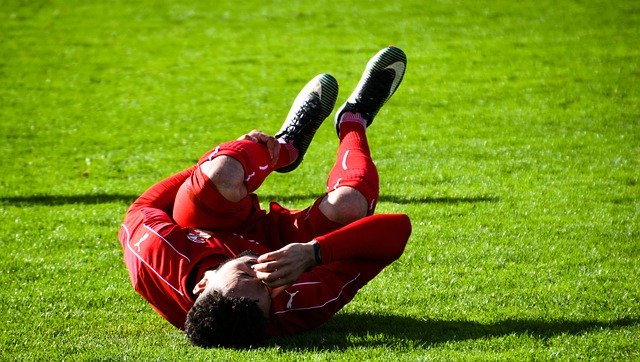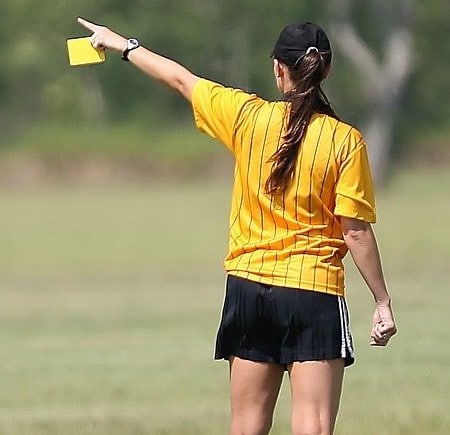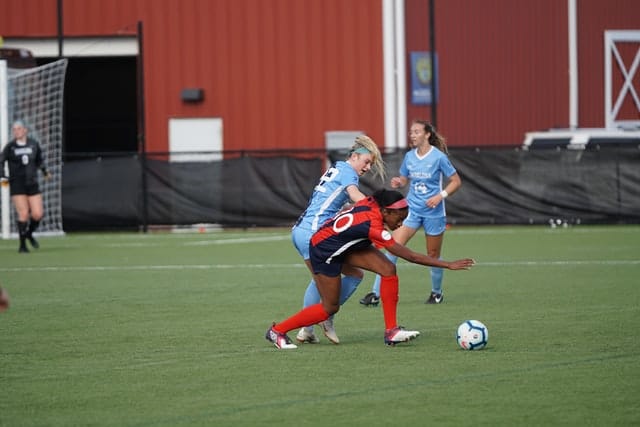During a soccer match, you’ll see players falling on the ground several times usually due to contact with other players on the field.
Some of these players grab the ball the moment they fall on the ground if the ball remains close to them when they fall. I have been watching soccer for more than 10 years and I have seen some players grab the ball after they fall countless times.
But why exactly do they do that is the question here.
Soccer players sometimes grab the ball immediately after they fall either to make sure that the game stops and that they get a chance to ask for a foul, or to prevent their opponent from advancing forward, or to waste the opponent’s remaining time to score and make a comeback.
That’s generally why the players sometimes grab the ball when they fall, but if you want a longer explanation of each of the reasons mentioned above, then here’s all of what you need to know:
What does the player benefit from grabbing the ball after they fall?
1- They get a chance to negotiate winning a foul with the referee.
Or at least that’s what they think. Usually, when a player falls and then grabs the ball, what they immediately do next is pretend to be extremely hurt (they may or may not be really hurt) or raise their hand asking the referee for a foul.

However, most of the time, grabbing the ball after a player falls does not affect the referee’s decision on whether they are going to get a foul or not.
The soccer referees are required to make their decisions in a split of a second with the help of their assistant referees. In other words, by the time the player grabs the ball after they fall, the referee has most probably already made their decision.
However, if for some reason the referee didn’t make up their mind before the player grabs the ball, then the player might be able to convince the referee that they deserve a foul. This is rarely the case however, especially if the player is dealing with a professional and a well trained team of referees.
It is sometimes possible for the referee to change their decision if the game hasn’t restarted yet, but again, this rarely happens and the referees don’t usually change their decisions during a soccer game just to establish dominance on the field and to make sure that the players aren’t encouraged to resist the future decisions that the referees make.
2- They prevent their opponent from advancing forward
This is usually done by the defenders of the team. If the opponent is attacking, and they hit one of the defenders, then the defender might decide to grab the ball when they fall just to end the opponent’s attack and to give their teammates some time to reposition themselves properly.
The defender might know that they are not going to get a foul, and that they might get a warning from the referee, but sometimes they take the risk anyways because a verbal warning from the referee might be worth eliminating the danger of the opponent’s attempt to score a goal.
For example, if the game is a champions league final and the defender’s team is already winning, then getting a yellow card by grabbing the ball after they fall might be a better option for the defender than letting the opponent get a great chance to score a goal.
3- They waste the opponent’s time.
If you don’t already know, the clock in soccer keeps counting even if the game is stopped for any reason. This means that if the player who fell decides to grab the ball and stop the game, they will waste some of the game’s time.
The referee can add some of this time at the end of the match as an ‘extra time’, but usually, the referee doesn’t really compensate for all the time lost during the game.
For these reasons, some players grab the ball when they fall just to waste the opponent’s time to make a comeback.
Wasting the opponent’s time is something that you see a lot in soccer matches. For example, if team A is winning against team B, and there are only 10 minutes left, you’ll usually see team A doing everything in their power to waste the remaining 10 minutes so that their opponents get angry and lose the remaining game time needed to make a comeback. They do this especially when they know their opponent is better and is capable of making a comeback.
These are generally the main reasons why soccer players sometimes grab the ball after they fall, but there are a few more questions that need answers before I end this article.
Is grabbing the ball usually punished by the referee?
If the player who fell deserves a foal, then the player will give them the fall and they will not be punished from attempting to stop the game because the game should have already been stopped due to the foul.
However, if the referee thinks that the player doesn’t deserve a foul, then they might give them either just a verbal warning or a yellow card for a “handball offense”.

The referee might even go for a red card if the player who grabbed the ball denied a very dangerous goal scoring chance for their opponent.
What happens after a player grabs the ball when they fall?
What happens depends on where the grabbing took place. If it’s outside the penalty areas of the soccer field, then the 2 possible outcomes are the following:
- The player who grabbed the ball gets a free kick.
- The opponents get a free kick and the player who grabbed the ball might be punished with a card.
What’s more tricky is when a player grabs the ball after they fall inside one of the penalty areas.
Since penalty kicks usually result in a goal, the fans and the whole world will be watching the referee’s decisions inside the penalty area more closely.
If a player grabs the ball inside their team’s penalty area just to ask for a foul and to end the opponent’s chance to score, the player might get a card and the opponent gets a penalty kick if the player did not deserve a foul after they fell. However, if the player deserved getting a foul, then they’ll just get a free kick for their team.
If the player grabs the ball inside their opponent’s penalty area after they fall, then either the opponent gets a free kick if the player doesn’t deserve a foul (and possibly a yellow/red card for the player who grabbed the ball), or the player gets a penalty kick if the foul was deserved.
Note that the fouls would have most probably been given anyways by the referee even if the player didn’t grab the ball. In other words, grabbing the ball usually doesn’t change the referee’s decision in these matters, especially when it comes to penalty kicks because penalty kicks are more sensitive than other types of kicks in soccer.
CONCLUSION
At the end of the day, when a soccer player grabs the ball after they fall, they are basically taking a risk of getting punished with a card from the referee just to either get a chance to win a foul or to deny a great scoring opportunity for their opponent.

